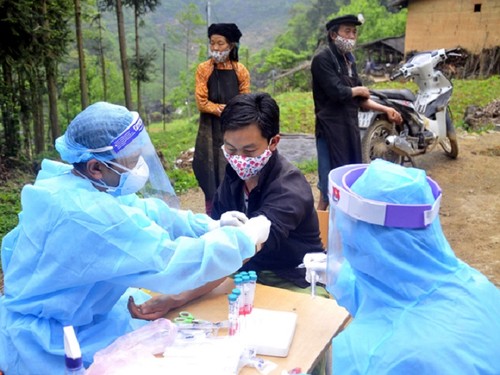 Ethnic minority people in Pin Tung village, Pho La commune, Dong Van district, Ha Giang province receive COVID-19 tests (Photo: baodantoc.com.vn) Ethnic minority people in Pin Tung village, Pho La commune, Dong Van district, Ha Giang province receive COVID-19 tests (Photo: baodantoc.com.vn) |
Among the UPR’s 5 recommendations on education, ensuring the right to access education is the basic goal of Vietnam’s socio-economic development strategy. Vietnamese law stipulates that the State prioritizes educational development in mountain, island, ethnic minority, and disadvantaged regions. Citizens have the right to use their mother tongue, decide their mode of communication, and have equal access to education.
Vietnam’s ethnic minority and mountain regions have universalized kindergarten, primary, and secondary education. 6 ethnic minority languages, including Mong, Cham, Khmer, Gia Rai, Ba Na, and Ede, are being taught to 185,000 schoolchildren in 21 cities and provinces nationwide. 6 other minority languages, including Hoa, Thai, Co Tu, Tai Oi, Kako, and Mong, are being piloted in classes for thousands of students. Boarding schools have been established in 28 cities and provinces for 185,000 students. Students of 51 out of Vietnam’s 53 ethnic minority groups receive training to benefit local socio-economic development. Vietnam’s policies to support education and vocational training have benefited more than 1.1 million ethnic minority people – 14% of the 8 million ethnic minority people of working age.
In the past few years, the government has implemented programs, policies, and infrastructure development investment projects in ethnic minority regions. These include the 2016-2020 National Target Program on Sustainable Poverty Reduction, the National Target Program on Rural Development, Program 135, and Program 30A. Thanks to these programs, the network of schools in these regions has been expanded. All communes have kindergarten, primary, and secondary schools, and many clusters of communes have high schools.
Vietnam has invested in preserving and promoting ethnic minority cultures and implementing recommendations of the UPR. Ethnic minority regions have 4 special national relic sites and 8 historical and cultural relics. The State President has awarded the title folklore artisan or emeritus artisan to 559 ethnic minority people.
Vietnam has paid attention to preserving and promoting the spoken and written languages of ethnic minority groups. Ethnic minority cultural festivals and sports festivals are held annually. More than 16,000 cultural centers have been built. 95% of ethnic minority communes have radio and TV service, and radio and TV programs in an ethnic minority language have been expanded. 100 print newspapers, 200 websites, and 18 publications are provided for free to ethnic minority regions.
The health care network in Vietnam’s ethnic minority regions has been strengthened, giving people better access to health care services. Poor people receive free health care and subsidized health insurance. Vietnam has achieved the Millennium Development Goals of reducing malnutrition and maternal and child mortality rates in ethnic minority regions. The goal of the 2021-2030 National Target Program on Sustainable Development in Ethnic Minority and Mountain Regions is to improve health care and develop human resources in those regions. The 2021-2030 National Target Program on Socio-Economic Development for Ethnic Minority and Mountain Regions aims to improve the status of small ethnic minority groups, reduce poverty, improve people’s material and emotional life in a sustainable manner, and narrow development gaps between groups. It also wants to upgrade infrastructure in disadvantaged regions to bolster national construction and defense and strengthen national unity.